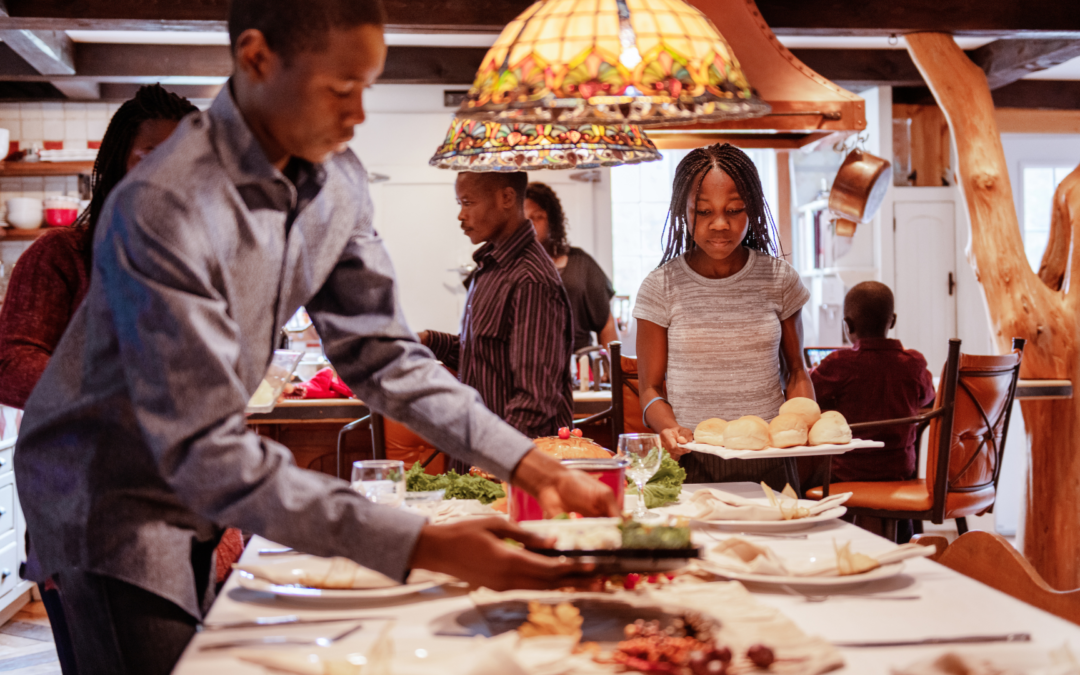Stress and depression are frequent uninvited visitors during the Holiday season, a period beginning around Thanksgiving (November) lasting until the New Year (January). Which makes sense. The duties around the holidays can be overwhelming; the cooking, shopping, baking, cleaning, and entertaining can be exhausting. The plans and expectations of the holiday season place many of us under extra stress including the experience of tension, depression, sadness, or anxiety.
The truth is that if you feel down during this season, you are not alone because many people express heightened mental illness and stress during holidays. Research from the National Alliance of Mental Illness (NAMI) shows that 64% of people with mental health issues have their cases worsen during holidays. However, you may reduce the stress that comes with the holidays by following some useful advice.
How to Support Mental Health in the Black Community During The Holidays?
It’s challenging to pause and regroup when stress levels are at their highest. If the holidays have caused you emotional harm in the past, you may be particularly invested in attempts to avoid stress, anxiety, and depression altogether. While nothing can guarantee that you won’t experience negative feelings during the holidays, measures can be implemented to help you to stay mentally well during the holidays. Read closely.
Say “no” more often
Saying yes when you ought to say no can make you overburdened and lead to feelings of resentment. Your friends and coworkers will be sympathetic if you are unable to take part in every project or activity.
Set Boundaries
Similar to saying no, it is important to communicate limits to others in order to protect your personal space. Set boundaries that allow you the space to be accountable for your own emotional and psychological health.

10 Tools for Better Mental Health in the Black Community
Eat, Sleep, and Drink
Remembering to take care of your basic living needs is the first line of defense when you feel off balance. Making a few adjustments could provide huge benefits towards managing depression or anxiety.
Recognize your emotions
Acknowledge that all feelings are valid and have an appropriate place in your experience.It’s possible that you may feel sadness or grief during this time. It’s acceptable to take some time to sob or vent your emotions. You may also experience stress. Remember, just because it’s the holiday season doesn’t give you the responsibility to make yourself joyful.

Balance obligations with free time
When you are absolutely unable to refuse a request, try to remove other items from your schedule to offset time spent at events. Remember to create the time that you need for yourself and commit to keeping appointments with yourself.
Ask for Help
Why have a support network if you don’t use it? We were never designed to do all of the things, which is why we live in communities. Find relief by enlisting those close to you to assist with various tasks. If you ask for help and someone thinks you are weak, reevaluate the relationship, not your needs. It is also alright to enlist the support of a therapist so that you always have someone to lean on that can give guidance during the holidays.
Be realistic
Holidays don’t need to be flawless or identical to last year. Traditions and rituals frequently evolve along with families as they expand and change. Hold onto a select few while remaining open to forming new ones.
Maintain a budget
Determine how much money you can spend before going out to buy food and gifts. Then follow your spending plan. Avoid trying to purchase happiness with a barrage of presents. You may also consider alternatives to purchasing gifts such as giving to charity, making handcrafted gifts, or starting a holiday gift exchange with the family.
Take a moment to pause
Give yourself some alone time. Find a hobby you like to do. Go alone and take a rest. Even 15 minutes of uninterrupted time alone could provide you the energy you need to complete your tasks. Find something that relaxes you, slows your breathing, and helps you feel peaceful inside. Some possibilities include zoning out while listening to music, taking a mindful walk.
Have an exit plan
When all else fails, don’t force yourself to stay in situations that create distress or discomfort. Make a plan that helps you recognize when you’ve reached your limit and how you will remove yourself from unhelpful situations.
In the end, you might find that you enjoy the holidays more than you anticipated.
NOTE: Serious mental health issues might require professional attention. Those experiencing intense, overpowering feelings or thoughts of harm to themselves or others including suicide should reach out for immediate assistance.
If you or someone you know is experiencing a mental health emergency, please contact the National Suicide and Crisis Lifeline. Simply dial 9-8-8 from any phone anywhere in the United States to be connected to a local crisis center based on the caller’s area code.
Start Therapy in Atlanta for Your Mental Health
You do not have to go through the holidays struggling with your mental health. Whether it is stress, anxiety, or depression you can get support from an Atlanta therapist. You can start counseling either in person at our Atlanta-based therapy practice or virtually through online therapy in Georgia. Allowing you to get support even if you have to travel for the holidays.
Follow these steps to get started:
-
-
- Contact us today to speak with a caring staff member
- Start getting therapy that is tailored to mental health in the black community
- Feel better throughout the holidays
-
Other Therapy Services at Simplicity Psychotherapy in Atlanta, GA
We offer a variety of relationship and individual therapy for black women and black men. That includes premarital counseling, couples therapy, and marriage counseling. As well as LGBTQIA therapy, grief counseling, and sliding scale therapy.
The material provided in this blog post was generated based on a combination of general professional knowledge about the subject matter discussed as well as common practices and recommendations in psychology and healthcare.
Note: While the information above is intended to provide insight as you begin your journey they are not intended to replace the guidance of a trained professional. Exploring these concerns in the presence of a licensed counselor or other licensed professional may provide deeper insight and assist in managing more multifaceted concerns that may arise.

About the Author
Hi, I’m Rayvéne Whatley, a Licensed Professional Counselor practicing in Georgia, Louisiana, and Texas. I’m passionate about empowering people, especially Black men and women, to remove the mask of other people’s expectations and step into their authentic selves.
Much of my work focuses on addressing the impact of racial trauma on mental health. The intersection of identity, systemic stressors, and societal expectations can create layers of anxiety, self-doubt, and emotional pain. I help clients navigate these experiences by reexamining beliefs that no longer align with their goals and replacing them with ones that support their desires and values.
Through my writing, I aim to share insights and resources to help you better understand the connection between racial trauma and mental well-being, while offering tools to reclaim your peace and balance.
Whether you’re here for guidance, validation, or inspiration, I’m glad you’ve found this space.Healing isn’t always easy, but it’s worth it—and you don’t have to do it alone.


